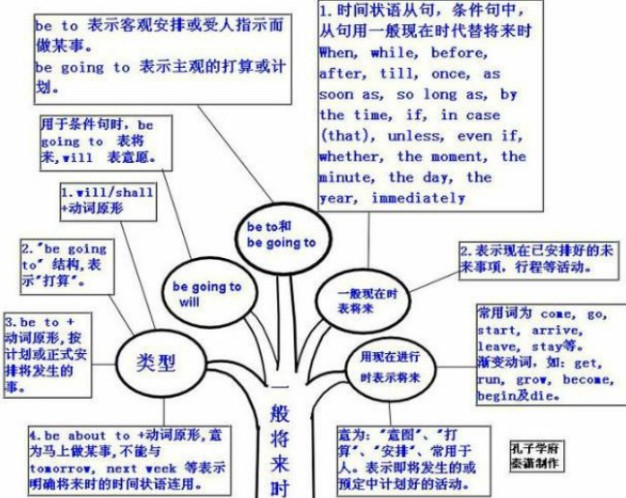本试题 “-Mr Li has been in hospital for 3 days.-Oh,really.I________.________to see him after work.[ ]A.don’t know;I’ll goB.don’t know;I am goingC.did...” 主要考查您对一般过去时
一般将来时
等考点的理解。关于这些考点您可以点击下面的选项卡查看详细档案。
- 一般过去时
- 一般将来时
一般过去时的概念:
一般过去时表示过去某个时间里发生的动作或状态;过去习惯性、经常性的动作、行为;过去主语所具备的能力和性格。
一般过去时的用法:
1、表示过去发生的动作或存在的状态,常与表示过去时间的副词如:yesterday,last week,two hours ago等连用。
如:My family moved here five years ago. 我家五年前搬到了这里。
I was born in 1973. 我生于1973年。
2、表示过去一段时间经常或反复发生的动作。这时可与频度副词如:often,usually,always等连用。
如:He always worked in tonight those days. 那些日子他总是工作到深夜。
I often left on business in 1987. 1987年我经常出差。
注:表示“过去经常,而今不再”时,要用usedto.
如:I used to read newspaper after breakfast. 我过去经常早饭后看报纸。(意指现在已不是这样)
The children often swam in this river. 孩子们过去经常在这条河里游泳。
3、表示过去发生的一连串动作。
如:He put down the heavy box, took out the keys, and opened the door. 他放下这沉重的箱子,掏出钥匙开了房门。
注:过去发生的一连串动作,若用and,or,but等并列连词连接,则一律用过去式。
如:They moved the chairs to the table, sat down and began to have supper. 他们把椅子搬到桌边,坐下开始吃饭。
4、在时间和条件状语从句中,用一般过去时表示过去将来的动作。
如:He said that he would let me know as soon as he got the information. 他说他一得到消息就立即让我知道。
Mary told me that she would stay at home if it rained. 玛丽告诉我如果下雨她就呆在家里。
一般过去时的特别用法:
1、句型:It is time for sb. to do sth "到……时间了" "该……了"。
例如:It is time for you to go to bed.你该睡觉了。
It is time that sb.did sth. "时间已迟了" "早该……了"。
例如:It is time you went to bed. 你早该睡觉了。
2、would(had)rather sb.did sth. 表示'宁愿某人做某事'。
例如:I'd rather you came tomorrow. 还是明天来吧。
3、wish, wonder, think, hope等用过去时,作试探性的询问、请求、建议等,而一般过去时表示的动作或状态都已成为过去,现已不复存在。
例如:I thought you might have some. 我以为你想要一些。
比较:Christine was an invalid all her life.(含义:她已不在人间。)
Christine has been an invalid all her life.(含义:她现在还活着)
Mrs. Darby lived in Kentucky for seven years.(含义:达比太太已不再住在肯塔基州。)
Mrs. Darby has lived in Kentucky for seven years.(含义:现在还住在肯塔基州,有可能指刚离去)
注意:用过去时表示现在,表示委婉语气。
1)动词want, hope, wonder, think, intend等。
例如:Did you want any thing else? 您还要些什么吗?
I wondered if you could help me. 能不能帮我一下。
2)情态动词could, would。
例如:Could you lend me your bike? 你的自行车,能借用一些吗?
一般将来时的概念:
一般将来时表示将来某一时刻的发生动作或状态,或将来某一段时间内经常的动作或状态。常与表示将来的时间状语连用。
一般将来时用法:
1)shall用于第一人称,常被will所代替。will在陈述句中用于各人称,在征求意见时常用于第二人称。
例如:Which paragraph shall I read first?我先读哪一段呢?
Will you be at home at seven this evening? 今晚七点回家好吗?
2)be going to+不定式,表示将来。
a. 主语的意图,即将做某事。
例如:What are you going to do tomorrow? 明天打算作什么呢?
b. 计划,安排要发生的事。
例如:The play is going to be produced next month。这出戏下月开播。
c. 有迹象要发生的事。
例如:Look at the dark clouds, there is going to be a storm. 看那乌云,快要下雨了。
3)be+不定式表将来,按计划或正式安排将发生的事。
例如:We are to discuss the report next Saturday. 我们下星期六讨论这份报告。
4)be about to+不定式,意为马上做某事。
例如:He is about to leave for Beijing. 他马上要去北京。
注意:be about to do不能与tomorrow, next week 等表示明确将来时的时间状语连用。
一般将来时知识体系:

一般现在时表将来:
1)下列动词come, go, arrive, leave, start, begin, return的一般现在时可以表示将来,主要用来表示在时间上已确定或安排好的事情。
例如:The train leaves a tsix tomorrow morning. 火车明天上午六点开。
—When does the bus star? 汽车什么时候开?
—It stars in ten minutes. ?十分钟后。
2)以here, there等开始的倒装句,表示动作正在进行。
例如:Here comes the bus.=The bus is coming. 车来了。
There goes the bell.=The bell is ringing. 铃响了。
3)在时间或条件句中。
例如:When Bill comes(不是will come), ask him to wait for me. 比尔来后,让他等我。
I'll write to you as soon as I arrive there. 我到了那里,就写信给你。
4)在动词hope, take carethat,makesurethat等的宾语从句中。
例如:I hope they have a nice time next week. 我希望他们下星期玩得开心。
Make sure that the windows are closed before you leave the room. 离开房间前,务必把窗户关了。
现在进行时表示将来:
下列动词come, go, arrive, leave, start, begin, return等现在进行时可以表示将来。
例如:I'm leaving tomorrow. 明天我要走了。
Are you staying here till next week? 你会在这儿呆到下周吗?
与“-Mr Li has been in hospital for 3 days.-Oh,really.I_____...”考查相似的试题有:
- He was wild with joy when he ______ a solution to the difficult problem.A.made up withB.put up withC.came up withD...
- —Ouch! You hurt me.—I'm sorry. But I ________ any harm. I ________ to drive a rat out.A.don't mean; am tryingB.didn...
- students with their teachers a good weekend.[ ]A. Many a; hasB. A large number of; hadC. A large amount of; hadD. A l...
- —Have you ever been to Singapore?—Yes, I ________ there three times in 2009 alone.A.have beenB.have goneC.wentD.h...
- Vincent van Gogh’s paintings were at last _____ as works of genius.A.practicedB.recognizedC.realizedD.promised
- — I'm here almost half an hour. How come it _____ you so long?— Sorry, honey! I had to drive two blocks before I spot...
- — Thomas didn't come to school for the meeting, did he?— No. He ____. The meeting had been cancelled.[ ]A. shouldn't ...
- _____ the hero had done and said _____ everyone present deeply.[ ]A. What, movedB. That, to moveC. What, movingD. Tha...
- 短文改错。此题要求改正所给短文中的错误。对标有题号的每一行做出判断:如有错误(每行只有一个错误),则按下列情况改正:此...
- I had wanted to take the career of being a model, but I ________ not good at dealing with constant media attention.A...